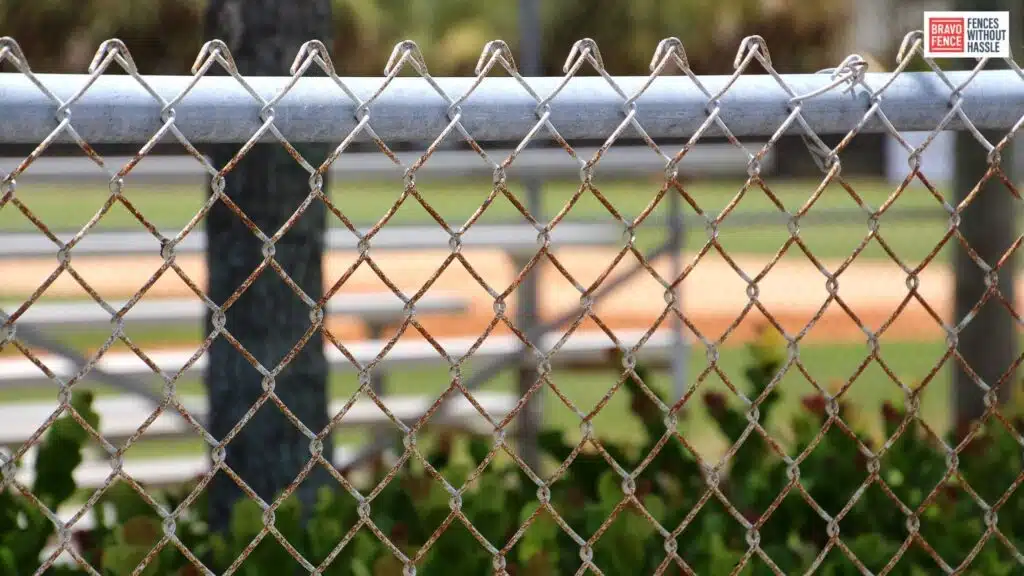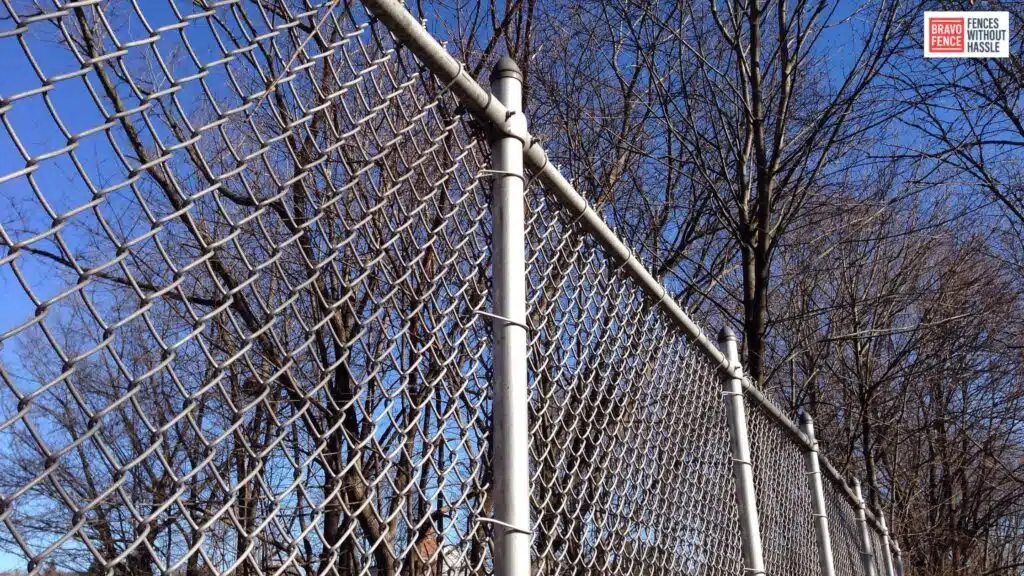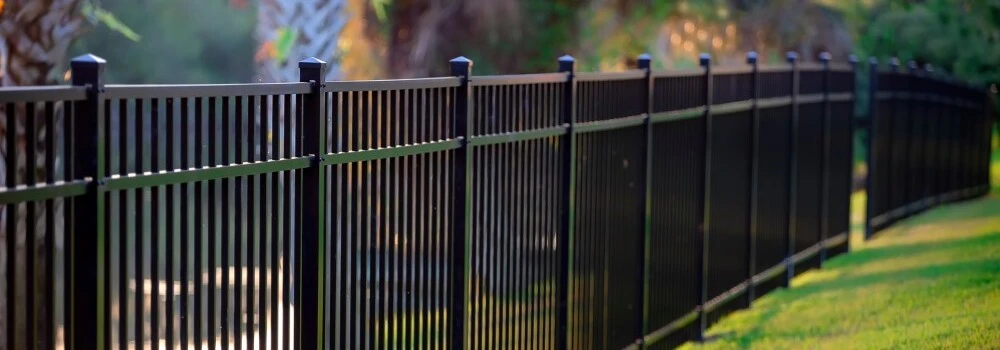
Tips for Weather-Proofing Your Chain Link Fence in Harsh Environments
A chain link fence may be a great asset to your property, bringing you security and delimiting a boundary.
However, it would be unfortunate if extreme climatic conditions such as heavy rain, snow, or scorching heat topple your favourite fence.
Weatherproofing is not merely aesthetic but is, in fact, friendly in terms of durability and longevity.
The horror of imagining buying a solid chain link fencing system that eventually rusts away or bends under the power of high winds; don’t worry, you can take some measures to protect your investment against Mother Nature’s wrath.
Whether you are faced with solar heat or cold winters, we have put together some useful tips that will ensure your chain link fence continues to look its best and serve you well regardless of what happens to it.
So, let’s get into it and learn how you can effectively weatherproof your fence!
Understanding the Effects of Harsh Environments on Your Fence

Chain link fencing is strong.
However, extreme weather conditions can still impact its life expectancy.
Harsh environments will affect the longevity of your fence when the weather is unforgiving and catastrophically bad.
High rainfall, hurricane-force winds, and excessive ultraviolet exposure can cause rust and corrosion, thereby weakening the structure in the long run.
Extreme temperature fluctuations expand and contract the metal parts of this fence.
Continued stress, in this case, can cause warping or bending of the fence lines.
Freezing temperatures with subsequent thawing create a cycle that could destabilize the ground around the posts.
Marine salt exposition in coastal regions accelerates further decaying because oxidation occurs highly quickly on the surface of metals.
Also, debris brought by strong winds may cause mechanical damage if it strikes your fence several times.
Knowledge of these environmental factors will allow you to take proactive actions regarding the maintenance of your fencing.
This is basically knowing how to protect this outdoor feature against natural elements.
Some Tips for Weather-Proofing Your Chain Link Fence
Tip 1: Use High-Quality Weather-Resistant Materials
Chain link fence materials should be of the best possible quality.
Not all fences are cut from the same cloth.
Some will perform much better than others when the weather gets tough.
It would be money well spent and time invested now for durable, long-lasting options.
It would help if you looked for materials that are either galvanized or coated in vinyl.
Galvanization gives a protective layer against rust, while vinyl coats add a layer of protection from UV rays and moisture.
It will greatly increase the durability of your fence.
You would choose the fencing material according to the thickness and gauge.
The heavier the gauge, the more strength it is, and the less likely it is to bend or warp when very hot or when pounded by strong winds.
Don’t forget hardware like posts, gates, and fittings!
Choose similarly sturdy materials that hold up to environmental stressors, at least as well as the main fence itself.
Tip 2: Maintenance through Regular Cleaning for Lifespan
Your chain link fencing requires regular cleaning to last long.
Dirt, debris, and algae can eventually begin building up and affecting both aesthetics and functionality.
It is easier to prevent these issues from starting before they begin.
Face the fence with a mild soap solution and a soft brush.
This is rather an easy cleaning that may remove all dirt-causing grime, which can lead to rust or corrosion.
Clean it at least twice a year for better efficiency.
Do not forget the posts and the accessories attached to the fence.
Regular inspections should be conducted to ensure that all parts are in good condition and free from loose fittings and rust spots.
In a sense, a timely minor repair will help you avoid costly problems in the long run.
Routine maintenance also includes checking the base of your fence and making sure that it doesn’t cave in.
Once you observe any movements caused by erosion and water, you should immediately reinforce those areas to avoid major problems.
Tip 3: Apply Protective Coatings to Prevent Rust and Corrosion
Applying protective coatings to your fencing is the most effective way to prolong its life.
Harsh environmental conditions lead to rust and corrosion; however, if you apply the right treatment, then you can protect it as well.
The addition of a good-grade rust inhibitor or galvanization process on the metal parts of your fence would also act as an additional layer against moisture and other corrosive elements that would deteriorate the wall.
Inspect these coats regularly for chipping or fading.
Touch up the paint once you notice some chipping or fading to prevent having them repaired later.
Consider powder coating for the most enhanced durability and appearance.
The treatments not only ensure rust protection but also make your chain link fencing look attractive.
Tip 4: Base Installation to Resist Super Weather Conditions
A strong foundation is crucial for any chain link fencing, especially in areas prone to extreme weather.
Poorly anchored fences can easily be damaged by high winds or heavy rain.
To avoid costly repairs later, invest time and resources into a solid base.
Begin by digging holes that reach at least 2 feet deep to support anchoring correctly.
The hole dug to such a depth helps withstand post-shift, hence breakage due to soil erosion or frost during the cold seasons.
The application of concrete works to ‘lock’ the posts down more firmly: an added strength against harsh conditions.
Consider galvanized steel instead of aluminium for fence posts.
Galvanized steel is more durable and resistant to bending in windy storms or against debris.
Inspect the foundation of your fence after every stormy weather.
A prompt response to small problems can prevent their development into major issues and, thus, extend the life of your fence.
Tip 5: Supplemental Support to Your Fence
Reinforcing a chain link fence can significantly increase its stability and life.
In extreme weather conditions, high winds and torrential rains wear down the best of fences.
Added supports to ensure that your fence will not buckle over to the sides from the elements.
Consider adding tension wires along the top and or bottom of the fence.
These can help reinforce strength to the fabric portion of the structure and ensure that pulls happen evenly on the entire construct.
This is a simple addition that provides a stronger barrier for wind blasts.
Another could be the installation of concrete footings, possibly at regular intervals.
These footings would help secure posts in place without the possibility of movements brought about by storming floods, among other extreme forms of weather.
Additionally, cross-bracing with diagonal supports adds further stability to your chain link fencing system.
By implementing these strategies, you’ll protect your investment while ensuring it remains functional for years to come.
Tip 6: Use Weather-Resistant Accessories for Enhanced Durability
When weatherproofing your chain link fence, accessories play a crucial role.
Using weather-resistant items ensures you’re not compromising on durability.
For instance, opt for vinyl or plastic-coated ties instead of traditional metal ones.
These materials resist rust and will maintain their integrity in harsh conditions.
Gate latches and hinges may be made of stainless steel or coated metals.
These are some of the parts of a gate that often take all the elemental forces like rainfall, snowfall, and intense sunlight, so high-quality hardware can help avoid frequent replacement.
Added to these are the decorative caps for guarding the fence post tops from moisture accumulation.
Beyond the aesthetic appeal, they provide shielding of areas most vulnerable to penetration from water that might cause rot or corrosion.
It would help if you also remembered the tension bands and fittings meant for exterior applications.
As part of protecting every component within the chain link fencing, using highly long-lasting accessories makes the entire structure more resistant to natural forces.
Tip 7: Ensure Proper Drainage to Avoid Water Damage Over and Above
Proper drainage is key when maintaining the integrity of your chain link fencing.
In the long run, water pooling at the bottom can cause quite considerable damage, especially in areas that experience heavy rainfall or snowmelt.
Since water easily erodes the soil and compromises your foundation, ensure that drainage provisions are made appropriately around your fence.
To prevent these issues, assess the drainage pattern of your area.
Observe natural routes water follows from rain and imagine how it would influence your fence.
You may need to grade your land or include some form of drainage feature, such as a French drain or a swale.
Also, be sure to direct gutters and downspouts away from your fence line.
This small adjustment makes all the difference in terms of keeping moisture buildup to a minimum.
Monitor the area around your chain link fencing after every storm for any signs of damage early on.
Being proactive will help you protect your investment against water damage, which can prove to be costly in repair work.
Tip 8: Install Fences in Extreme Weather Conditions
Extreme weather conditions really call for some thought on upgrading your fencing.
While standard fences may be doomed in very strong winds, heavy snow, or relentless rain, you can improve their resilience by opting for a thicker gauge wire.
The sturdier the material, the more resistance to the elements it could withstand.
Another upgrade might include a vinyl coating.
This adds an extra layer against rust and corrosion and gives the fence a glossy look.
The added strength usually pays off in lower maintenance and longer life.
Install privacy slats to also protect your fence from strong winds and debris.
These slats have an aesthetic appeal, but they can also offer functional support during stormy weather.
You can also add tension wires or additional posts for better reinforcement.
These upgrades guarantee that your fencing will hold up when nature brings its worst.
Conclusion
Not only is it a good idea, but actually for the sustainable integrity and appearance of your chain link fencing, you need to weatherproof weatherproof it.
If you are in a place that experiences extreme weather changes, make sure you take proactive measures to care for your fence.
Apply these tips, and your investment will stay in good shape, offering the functionality and beauty you need, all year round!
FAQs
Why should I weatherproof my chain link fence?
Weatherproofing your fence will protect your fence from the damaging effects of extreme weather conditions, such as rust, corrosion, bending, and warping. Weatherproofing will extend the life of your fence, ensuring it continues to perform well over time instead of requiring costly repairs or replacement.
What types of materials are best for weatherproofing my fence?
The best choices for materials that can be used for your fence when weatherproofing are those that are galvanized or coated in vinyl. Since these materials are most protected against rust, they provide the best options with additional features such as UV protection and resistance to moisture. A heavier gauge will give more strength, making it less likely to bend under extreme weather conditions.
How often should I clean my chain link fence?
To maintain your fence’s durability and appearance, clean it at least twice a year. Use a mild soap solution and a soft brush to remove dirt, debris, and algae. Regular cleaning helps prevent rust and keeps the fence looking good while maintaining its functionality.
How can I prevent rust and corrosion on my fence?
Applying a protective coating, like a rust inhibitor or galvanization, can best achieve this. You also need to check whether the coating shows signs of chipping or fading and touch it up if necessary. Powder coating offers more excellent durability and a more aesthetically pleasing finish.
What kind of foundation is needed for my fence to withstand harsh weather?
A solid foundation is essential in resisting strong winds and heavy rainfalls. The fence posts must be anchored deep enough, at least 2 feet, and fixed with concrete. Galvanized steel posts are a good choice because they are more resistant to bending and shifting in extreme conditions.
How can I reinforce my fence for added stability?
Adding extra support, such as tension wires along the top and bottom of the fence, can help distribute stress more evenly during storms. Additionally, consider installing concrete footings at regular intervals or using diagonal cross-bracing to increase stability and prevent the fence from leaning or buckling.
Tags: Complete Guide to Chain Link Fence Care, Explore Helpful Resources on Chain Link Fence Maintenance, Inspiration and Tips on Weather Proofing Fences, Top Ideas and Insights About Fence Durability Solutions

